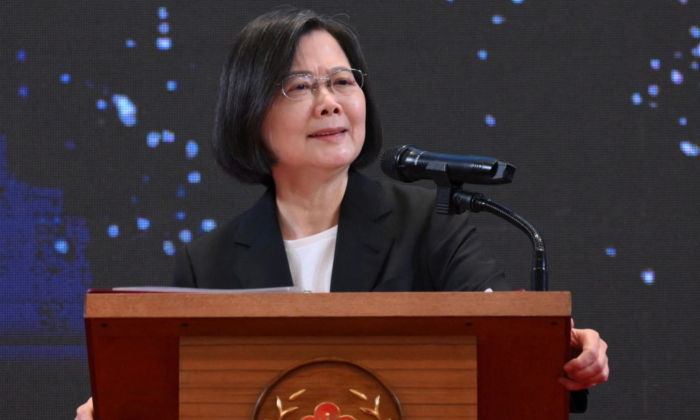Despite drawing China’s ire, the trip will ‘enhance’ Taiwan–Europe relations, said Taiwanese President Lai Ching-te.
Former Taiwanese President Tsai Ing-wen is scheduled to visit the Czech Republic and other European countries this weekend, Tsai’s office has announced, drawing the ire of China’s communist regime.
Tsai has been invited to attend and speak at the annual Forum 2000 conference, which will be held on Oct. 13–15 in the Czech Republic capital of Prague, her office confirmed on Monday.
“I look forward to seeing good friends & speaking at @Forum_2000 in #Czechia, & to sharing the story of #Taiwan’s commitment to democracy with the world,” the former president wrote on X.
Ahead of her trip to Europe, Tsai visited incumbent President Lai Ching-te on Monday.
In a statement after their meeting, the Presidential Office said that Lai “fully supports former President Tsai’s visit,” extends his best wishes to the former president for a smooth and successful trip, and that he is confident that Tsai’s visit will “further enhance the close friendships between Taiwan and European countries.”
Previously, Tsai was invited to the Forum 2000 conference in 2004 as head of Taiwan’s Mainland Affairs Council. She also delivered pre-recorded speeches at the forum on three occasions during her presidency.
Except for her Prague stop, the rest of Tsai’s Europe itinerary is yet to be confirmed officially “due to concerns of Chinese espionage and harassment,” reported Reuters on Monday, citing two diplomatic sources claiming that the former president also plans to visit France and Belgium in her trip.
Lai has “directed the National Security Council and the Ministry of Foreign Affairs to arrange the itinerary carefully and provide necessary assistance [regarding] security and related matters,” Presidential Office spokesperson Karen Kuo said in a statement on Monday.
In response to Tsai’s upcoming Europe trip, China’s foreign ministry spokesperson, Mao Ning, said that the Chinese Communist Party (CCP) “firmly opposes any Taiwan independence elements sneakily visiting countries that have established diplomatic relationship with China in any name.”
“We also sternly warn the Democratic Progressive Party authorities that Taiwan independence is a cul-de-sac,” she added.
Taiwan, officially called the Republic of China (ROC), is celebrating its 113th birthday on this year’s National Day on Thursday, which marks the start of the Wuchang Uprising in 1911 that overthrew the emperor of the Qing Dynasty. The ROC was founded in 1912 and retreated to Taiwan in 1949 after losing a civil war to the CCP. The People’s Republic of China (PRC), the official name of mainland China ruled by the CCP, turned 75 on Oct. 1.
The CCP claims that Taiwan is part of the PRC. Beijing labels anyone who defends Taiwan’s sovereignty as a “separatist” and opposes any formal relationship between the self-ruled island and other countries.
Lai refuted the CCP’s claims in a speech on Oct. 5 at a gala celebrating this year’s National Day.
“In terms of age, it is absolutely impossible for the People’s Republic of China to become the ’motherland’ of the Republic of China’s people. On the contrary, the Republic of China may be the motherland of the people of the People’s Republic of China who are over 75 years old,” the president said.Despite the CCP’s ire, Taiwan and the Czech Republic have maintained business and diplomatic exchanges.
In August 2020, amid the pandemic outbreak, Czech Senate speaker Milos Vystrcil visited Taiwan, leading a delegation of 89 people that included business leaders, senators, scientists, journalists, and Prague Mayor Zdenek Hrib. The CCP threatened to make Vystrcil pay a “heavy price” for visiting the island.
In March 2023, a Czech delegation of 150 members visited Taiwan intending to expand cooperation while expressing support for Taiwan’s democratic system.
Taiwanese Vice President-elect Hsiao Bi-khim visited the Czech Republic in March this year as part of her international trip before being sworn in in May. The CCP reacted to Hsiao’s visit by calling her and her delegation “Taiwan independence” separatist forces and urged the Czech Republic to handle the Taiwan issue prudently.
Tsai’s upcoming visit has also gained support from other members of the ruling Democratic Progressive Party (DPP).
Wu Szu-Yao, a DPP caucus leader, spoke highly of Tsai’s visit at a recent press conference, saying that Tsai will become “a key diplomatic representative of Taiwan” in the international arena and that her visit is going to be one of “very deep significance.”
The Forum 2000 was founded in 1996 by the late Czech President Vaclav Havel, Japanese philanthropist Yohei Sasakawa, and Nobel Peace Prize Laureate Elie Wiesel, according to its website, with the goal of “supporting the values of democracy and respect for human rights, assisting the development of civil society, and encouraging religious, cultural and ethnic tolerance.”
Frank Fang and The Associated Press contributed to this report.

